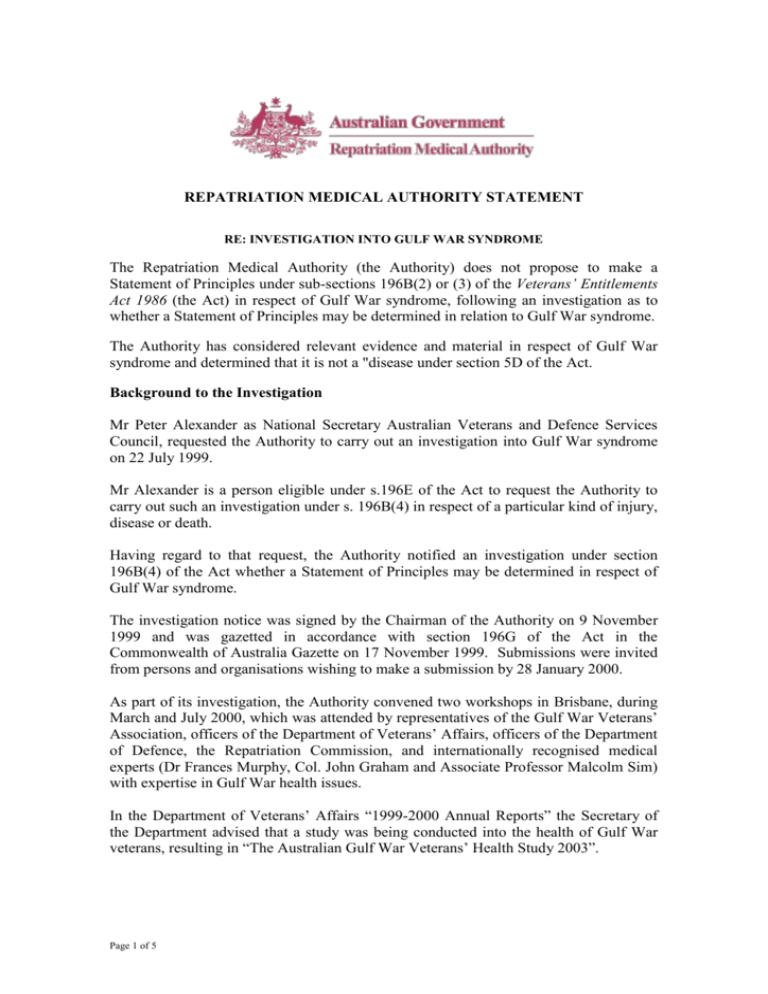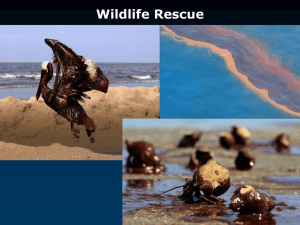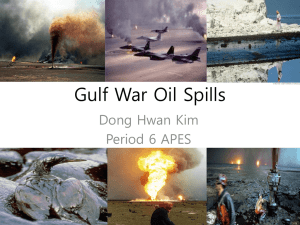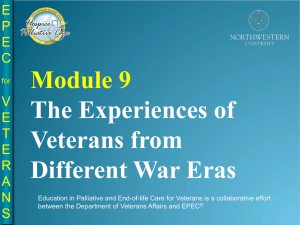Statement of reasons Gulf War Syndrome 18 August 2003
advertisement

REPATRIATION MEDICAL AUTHORITY STATEMENT RE: INVESTIGATION INTO GULF WAR SYNDROME The Repatriation Medical Authority (the Authority) does not propose to make a Statement of Principles under sub-sections 196B(2) or (3) of the Veterans’ Entitlements Act 1986 (the Act) in respect of Gulf War syndrome, following an investigation as to whether a Statement of Principles may be determined in relation to Gulf War syndrome. The Authority has considered relevant evidence and material in respect of Gulf War syndrome and determined that it is not a "disease under section 5D of the Act. Background to the Investigation Mr Peter Alexander as National Secretary Australian Veterans and Defence Services Council, requested the Authority to carry out an investigation into Gulf War syndrome on 22 July 1999. Mr Alexander is a person eligible under s.196E of the Act to request the Authority to carry out such an investigation under s. 196B(4) in respect of a particular kind of injury, disease or death. Having regard to that request, the Authority notified an investigation under section 196B(4) of the Act whether a Statement of Principles may be determined in respect of Gulf War syndrome. The investigation notice was signed by the Chairman of the Authority on 9 November 1999 and was gazetted in accordance with section 196G of the Act in the Commonwealth of Australia Gazette on 17 November 1999. Submissions were invited from persons and organisations wishing to make a submission by 28 January 2000. As part of its investigation, the Authority convened two workshops in Brisbane, during March and July 2000, which was attended by representatives of the Gulf War Veterans’ Association, officers of the Department of Veterans’ Affairs, officers of the Department of Defence, the Repatriation Commission, and internationally recognised medical experts (Dr Frances Murphy, Col. John Graham and Associate Professor Malcolm Sim) with expertise in Gulf War health issues. In the Department of Veterans’ Affairs “1999-2000 Annual Reports” the Secretary of the Department advised that a study was being conducted into the health of Gulf War veterans, resulting in “The Australian Gulf War Veterans’ Health Study 2003”. Page 1 of 5 Evidence and Material relied upon by the Authority A. Submissions received by the Authority pursuant to section 196F The Authority received information as part of its investigation from the following: (a) Mr Peter Alexander (National Secretary for the Australian Veterans and Defence Services Council) provided a request to investigate the condition of Gulf War syndrome dated 21 July 1999. Mr Alexander stated “The syndrome is seen as a disease as a whole in addition to the symptoms and components of a disabling ailment.” (b) Dr O Kay (Psychiatrist WA) wrote on 9 July 1999 seeking some recognition of somatic (Gulf War illness) and psychiatric disorders he had identified in Gulf War veterans. (c) Mr David Watts, Chairman of the Steering Committee, Gulf War Veterans Association provided material relating to potential aetiological agents including mycoplasma12 and neostigmine3 on 25 February 1998 prior to the investigation being advertised. This information was reviewed in the course of the investigation. (d) Mr Phillip Steele Chairman of the Gulf War Veterans and Peacekeepers Association WA submitted a report concerning depleted uranium.4 This report was received by the Authority on 9 June 2000. (e) No other submissions were received. B. Information During the period during which the Authority was conducting its investigation, numerous international and national bodies were also enquiring into and considering GWS. The Authority received and has included this information as part of its investigation as outlined below. a. b. c. d. Information as provided in the correspondence outlined in A. above; Literature search using Medline; Information gathered from workshops held in Brisbane on 6th March 2000 and 25 July 2000 as part of the Authority's investigation into Gulf War syndrome; Medical or scientific publications as set out in the reference list hereto; Nicolson GL and Nicholson NL Mycoplasma infections in Gulf War Illnesses From the President’s Panel on Gulf War Illness, 1995 2 Haier J et al Mycoplasmal infections in blood from patients with CFS, fibromyalgia syndrome or Gulf War illness From the Clinical and Scientific Basis of CFS, Sydney 1998. 3 ? Extract from MIMS pharmacopeia 4 Fahey D Swords to Plowshares, Inc National Gulf War Resource Centre Inc, Military Toxics Project Inc, Case Narrative Depleted Uranium (DU) September 20 1998. 1 Page 2 of 5 e. f. g. h. Conference summary as presented to the Authority on 6 February 2001 by a Medical Officer from the Secretariat who attended a conference on Gulf War illnesses in Washington DC in January 2001; Monographs concerning the health of Gulf War veterans and included in the reference list hereto; Findings of the 2001 report of the Expert Committee concerning the potential health effects of depleted uranium5; and The Australian Gulf War Veterans’ Health Study 20036. Reasons for the decision The UN mandated coalition forces who liberated Kuwait in the Gulf War dealt a decisive blow to Iraqi forces within a remarkably short period of time and with few allied combat casualties. In January, 1992, unexplained illnesses were described among Gulf War veterans in an army reserve unit based in Indiana, USA. Additional reports of ill veterans precipitated debate as to the nature of the "Gulf War syndrome" and whether it was being responsibly addressed. The Authority has considered the information available to it, as outlined above, in reaching its decision. The question of the existence and possible cause/s of “Gulf War syndrome” has been the subject of considerable discourse in the last decade. The Authority considered and had regard to the provisions of the Act and in particular, sections 5AB(2) (‘sound medical-scientific evidence’), 5D (‘disease’) ‘injury’, 8 (‘war caused death’), 9 (‘war caused injuries or diseases’), and Part XIA. Section 5D provides: “(1) In this Act, unless the contrary intention appears: disease means: (a) any physical or mental ailment, disorder, defect or morbid condition (whether of sudden onset or gradual development); or (b) the recurrence of such an ailment, disorder, defect or morbid condition; but does not include: (c) the aggravation of such an ailment, disorder, defect or morbid condition; or (d) a temporary departure from: (i) the normal physiological state; or (ii) the accepted ranges of physiological or biochemical measures; 5 Expert Committee to Examine Balkan Veteran Exposure to Depleted Uranium (2001). Review of Scientific Literature on the Health Effects of Exposure to Depleted Uranium. A report prepared for the Minister for Veterans' Affairs, Commonwealth of Australia. 6 Sim M., Abramson M., Forbes A. et al. (2003). Australian Gulf War Veterans’ Health Study (Vol 1-3). Commonwealth of Austalia. Page 3 of 5 that results from normal physiological stress (for example, the effect of exercise on blood pressure) or the temporary effect of extraneous agents (for example, alcohol on blood cholesterol levels). injury means any physical or mental injury (including the recurrence of a physical or mental injury) but does not include: a) a disease; or b) the aggravation of a physical or mental injury.” International research into the Gulf War syndrome has examined the health of the Gulf War cohort as well as the possible health effects of a range of potential toxic exposures including oil fire smoke, pesticides, insect repellents, depleted uranium, and medical exposures such as vaccinations and pyridostigmine bromide prophylaxis therapy. The most consistent finding in the Australian Gulf War veteran group was that they had developed more psychological disorders than the comparison group in the time since the Gulf War. The greatest increase in risk was for post-traumatic stress disorder, but other anxiety disorders, depression and substance use disorders, including problem drinking were also more common in the Gulf War group.7 It is also clear that US, UK and Australian Gulf veterans report suffering from more symptoms than non-Gulf veterans. A range of neuropsychological symptoms were amongst the symptoms most commonly reported. These symptoms are similar in their wide ranging nature despite markedly different exposures of each veteran. There is a percentage of Gulf veterans for whom the experience (or some part of its aftermath) has altered their health and/or the perception of their health and well being. While a range of adverse physical and/or psychologic health outcomes have been documented amongst some Gulf War Veterans, there has been no proven relationship noted between abnormal symptoms and any particular exposure. In addition, detailed medical examinations of exposed veterans have found no increase in objective physical measurements compared to the comparison group and laboratory testing has failed to show a unique pattern of abnormalities in the Gulf War veteran group.8 International research into the health of Gulf War Veterans has faced a number of methodologic limitations which include: Health outcome data based on self-report or self-referred populations. Difficulties in contacting study participants and low questionnaire response rates, particularly for control groups. Limited comparability of health outcomes between studies because of different instruments used and differences between the populations studied. Lack of baseline exposure data on which to base trends. Difficulties in objectively measuring exposures Limited objective data for retrospectively verifying self-reported exposure data which are sensitive to bias, and may vary and become less reliable over time.9 7 Occupational and Environmental Health Unit Monash University. Australian Gulf War Veterans' Study. 2003. Canberra, Commonwealth Department of Veterans' Affairs 8 ibid 9 Medical research Council. Health of Gulf War Veterans 2003 MRC. Page 4 of 5 Although a constellation of abnormal symptomatology has been reported from Australian and overseas studies of the health of Gulf War Veterans, the body of evidence does not support a unique Gulf War syndrome, given the variable symptomatology, the absence of a proven causative exposure or exposures, and a consistent lack of documented physical abnormalities amongst 10111213141516171819 Veterans. The Authority considers that “Gulf War syndrome” is not a disease or injury for the purposes of the Veterans Entitlement Act 1986 and is not a condition for which a Statement of Principles could be formulated. The Authority recognises that exposure to a range of physical, biological, psychological and chemical agents can be a cause of disease, and in these circumstances, factors are placed in the appropriate Statements of Principle. Decision At its meeting on 29 July 2003 the Authority decided not to make a Statement of Principles in respect of Gulf War syndrome for the purposes of subsection (2) or (3) of section 196B of the Act as the Authority concluded, for the reasons set out above, that it is not a disease or injury within the meaning of section 5D of the Act. Defense Science Board. Report of the Defense Science Board Task Force on Persian Gulf War Health Effects. Washington, DC: Office of the Under Secretary of Defense for Acquisition and Technology, June 1994. 11 Committee to Review the Health Consequences of Service during the Persian Gulf War, Medical Follow-up Agency, Institute of Medicine. Health consequences of service during the Persian Gulf War: initial findings and recommendations for immediate action. Washington, DC: National Academy Press, 1995. 12 NIH Technology Assessment Workshop Panel. The Persian Gulf experience and health. JAMA 1994; 272:391-5. 13 Committee on the DoD Persian Gulf syndrome Comprehensive Clinical Evaluation Program, Institute of Medicine, Division of Health Promotion and Disease Prevention. Evaluation of the U.S. Department of Defense Persian Gulf Comprehensive Clinical Evaluation Program. Washington, DC: National Academy Press, 1995. 14 Presidential Advisory Committee on Gulf War Veterans' Illnesses. Final report. Washington, DC: US GPO, December 1996. 15 Department of Veterans Affairs. VA Persian Gulf Expert Scientific Committee report (February 19, 1996). Washington, DC: Department of Veterans Affairs, 1996. 16 Committee on Measuring Gulf War, Medical Follow-up Agency, Institute of Medicine. Health consequences of service during the Persian Gulf War: initial findings and recommendations for immediate action. Washington, DC: National Academy Press, 1995. 17 Institute of Medicine. Gulf War Veterans: Measuring Health Washington, DC: National Academy Press, 1999. 18 Medical research Council. Health of Gulf War Veterans 2003 MRC. 19 Occupational and Environmental Health Unit Monash University. Australian Gulf War Veterans' Study. 2003. Canberra, Commonwealth Department of Veterans' Affairs. 1010 Page 5 of 5








